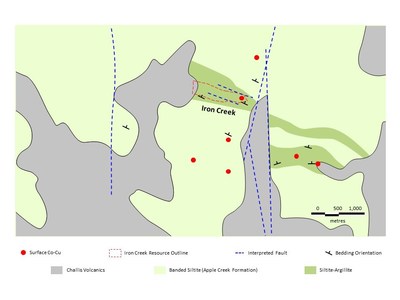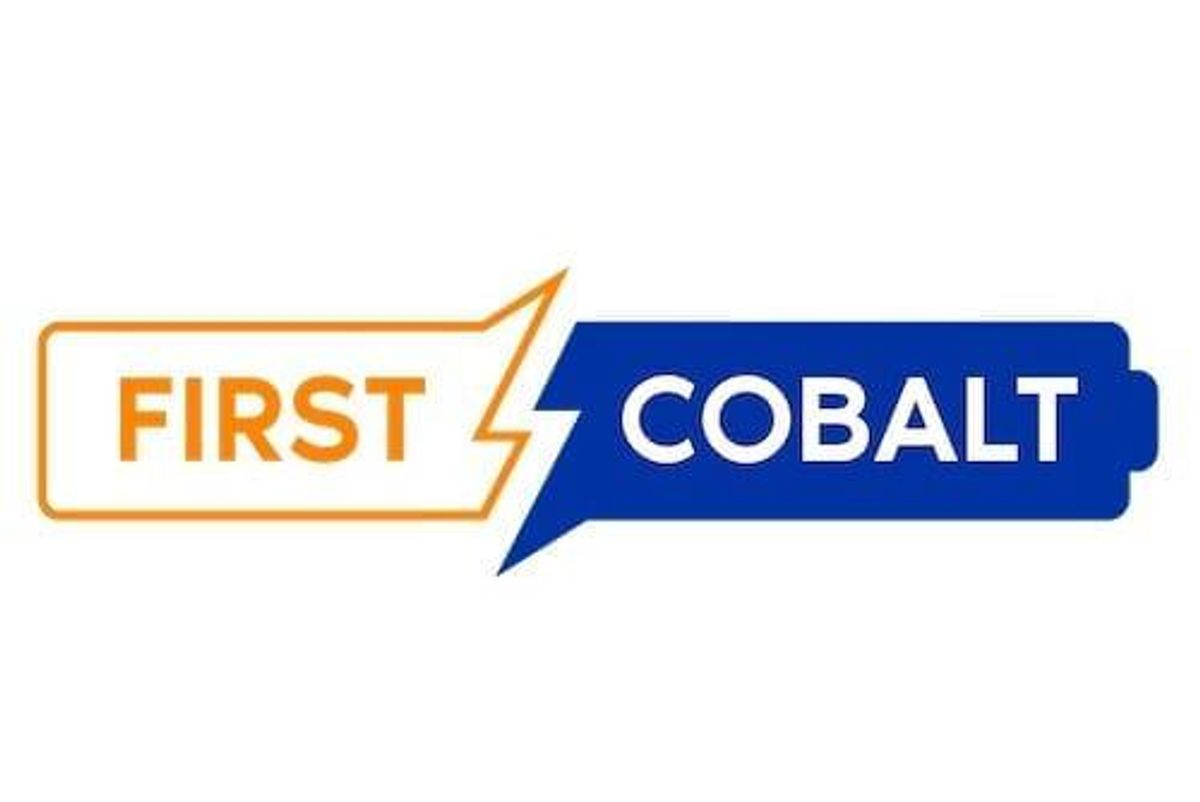First Cobalt Corp. (TSXV: FCC) (OTCQX: FTSSF) (the "Company") today announced the resumption of exploration activities at its Iron Creek cobalt-copper deposit in Idaho, USA . As the cobalt market continues to strengthen, the Company is commencing geophysical surveys to trace extensions of mineralization and follow up on geophysical anomalies detected by previous work.
Highlights
- Objective is to refine follow-up drill targets further east along strike of the cobalt-rich zone intersected over a 300m vertical depth (incl. 0.20% Co over 12.0m true thickness) as well as the western extension of the copper-rich zone (incl. 3.40% Cu and 0.10% Co over 2.6m true thickness)
- Program will trace the Iron Creek cobalt and copper resource below cover beyond the current 900-metre strike extent of the deposit
- Induced polarity and resistivity measurements have proven to be effective to detect cobalt-copper mineralization at Iron Creek
- Program will assess historic geophysical anomalies identified within the stratigraphic footwall below the resource
- Interpretation of geophysical results is expected later this year and will support planned resource drilling at Iron Creek in 2021 as well as further testing of nearby cobalt-copper mineralized targets, including the Ruby zone
Trent Mell , President & Chief Executive Officer, commented:
"Developing a domestic supply of cobalt and other critical minerals has taken a new urgency in 2020, as North America strives to become less reliant on foreign supply.
"The Idaho Cobalt Belt is a unique geological setting for primary cobalt deposits unlike any other areas in the world. New funding programs within the U.S. Department of Energy, the Department of State and the Department of Defense underscore the priority the U.S. government is placing on developing its domestic critical minerals supply chain.
"Since publishing an updated cobalt and copper resource estimate for Iron Creek earlier this year, we have had a three-pronged focus: extending cobalt mineralization to the east, extending copper mineralization to the west, and identifying new targets within a 2-kilometre radius on the property. This geophysics program will increase our confidence in existing drill targets that could expand the Iron Creek deposit and provide new targets.
"In 2019, we announced high grade cobalt assays up to 0.48% cobalt at a prospect 1.5 kilometres south of Iron Creek called Ruby. Ruby is exposed along a 300m strike extent and represents further near-surface potential for cobalt and copper mineralization on the First Cobalt's property."
Geophysical Survey
The geophysical survey is expected to take three weeks to complete and consists of induced polarity and resistivity measurements covering the eastern and western portion of the Iron Creek cobalt-copper mineralized zone and extending beyond and along strike (Figure 1). In 1971, following development of 600m of underground workings that confirmed the consistency and continuity of cobalt-copper grades, geophysical surveys were conducted at surface to aid exploration for further resources. This data was recovered from files and maps, then reviewed and interpreted in light of borehole geophysical surveys conducted in 2018 by First Cobalt. The review indicated induced polarity and resistivity methods detect mineralization to 300m below surface, a depth at which past drilling has intersected mineralization.
In the west, mineralization is covered at surface by the Challis Volcanics, a relatively young rock sequence that is un-mineralized and is 50- 70m thick. The western portion of mineralization is copper-rich consisting of 10-50cm semi-massive bands and stringers of chalcopyrite that are typically well detected by these electro-geophysical methods. First Cobalt drilling also encountered mineralization in the hangingwall above the mineralized zone in this area that will also be potentially outlined by the geophysical survey.
The previous survey also detected a chargeable inducted polarity anomaly in the east that corresponds to the stratigraphic footwall below the Iron Creek resource. The upcoming program is designed to resolve the location of the anomaly for proper drill testing to determine if additional cobalt-copper mineralization is associated with the geophysical response. Footwall mineralization was encountered during resource drilling but has not been modelled for estimation since the intersections were widely spaced.
Iron Creek Resource
Iron Creek is a high grade underground primary cobalt deposit on patented property in the United States . It currently has an Indicated Resource of 2.2 million tonnes at 0.32% cobalt equivalent (0.26% cobalt and 0.61% copper) for 12.3 million pounds of contained cobalt and an Inferred Resource of 2.7 million tonnes at 0.28% cobalt equivalent (0.22% cobalt and 0.68% copper) for an additional 12.7 million pounds of contained cobalt. The resource estimate used a 0.18% cobalt equivalent cutoff grade.
Drilling has outlined the strike extent of mineralization to over 900 metres and down-dip to over 650 metres. Mineralization remains open along strike and down-dip, suggesting strong potential for significant future resource growth. Thick mineralized zones of up to 30 metres of true thickness reflect broad stratabound lithological controls.
Iron Creek mineralization occurs as lenses and pods of pyrite, the dominant phase hosting cobalt, that are primarily concordant to the sedimentary layering in the host rocks. Chalcopyrite, the only copper mineral phase, is disseminated and also occurs as stringers cutting pyrite mineralization within the zone of mineralization.
The host rocks to mineralization are a finely inter-bedded sequence of siltstone and argillite with intermittent, less than 30cm thick, quartzite layers. Ripple and dune sedimentary structures are well-preserved throughout the mineralized sequence. A higher proportion of quartzite layers have been mapped above and below the mineralized zone at surface marking the stratigraphic hangingwall and footwall to mineralization.
Idaho Property Cobalt-Copper Mineralization
Several exposures of cobalt-copper mineralization occur within the property. At Ruby, surface channel sampling along 146 metres of the exposure returned several high-grade values, up to 7.6m of 0.26% Co and 10.7m of 0.24% Co, including 1.5m of 0.48% Co (previously reported October 30, 2019 ). Ruby is located 1.5 km from the Iron Creek deposit and occurs within a similar host-rock sequence that may be a structural offset to Iron Creek or a separate stratigraphic unit.
Other exposures of mineralization in the southern portion of the property have not been drilled tested but do demonstrate further potential for future follow-up exploration.
Iron Creek is one of many cobalt-copper resources and prospects within the Idaho Cobalt Belt where the United States Geological Survey has deemed these resources to be strategically important as a domestic supply of cobalt.
Qualified Person Statement
The contents of this news release have been reviewed and approved by Dr. Frank Santaguida , P.Geo., a Qualified Person as defined by National Instrument 43-101. Dr. Santaguida is a practicing member of the Association of Professional Geologists of Ontario and is employed by First Cobalt as Vice President, Exploration. Quality assurance and quality control standards of cobalt and copper values can be found in the respective press releases previously published.
About First Cobalt
First Cobalt owns North America's only permitted cobalt refinery. Cobalt refining is a critical component to the development and manufacturing of batteries for electric vehicles and forms a foundational piece of the next generation of the North American auto sector and other electrified consumer and industrial applications. First Cobalt owns the Iron Creek cobalt project in Idaho, USA and controls significant silver and cobalt assets in the Canadian Cobalt Camp, including more than 50 past producing mines.
On behalf of First Cobalt Corp.
Trent Mell
President & Chief Executive Officer
Neither TSX Venture Exchange nor its Regulation Services Provider (as that term is defined in policies of the TSX Venture Exchange) accepts responsibility for the adequacy or accuracy of this release.
Cautionary Note Regarding Estimates of Resources
Readers are cautioned that mineral resources are not economic mineral reserves and that the economic viability of resources that are not mineral reserves has not been demonstrated. The estimate of mineral resources may be materially affected by geology, environmental, permitting, legal, title, socio-political, marketing or other relevant issues. The mineral resource estimate is classified in accordance with the Canadian Institute of Mining, Metallurgy and Petroleum's "2014 CIM Definition Standards on Mineral Resources and Mineral Reserves" incorporated by reference into NI 43-101. Under Canadian rules, estimates of inferred mineral resources may not form the basis of feasibility or pre-feasibility studies or economic studies except for Preliminary Economic Assessment as defined under NI 43-101. Readers are cautioned not to assume that further work on the stated resources will lead to mineral reserves that can be mined economically. An Inferred Mineral Resource as defined by the CIM Standing Committee is "that part of a Mineral Resource for which quantity and grade or quality are estimated on the basis of limited geological evidence and sampling. Geological evidence is sufficient to imply but not verify geological and grade or quality continuity. An Inferred Mineral Resource has a lower level of confidence than that applying to an Indicated Mineral Resource and must not be converted to a Mineral Reserve. It is reasonably expected that the majority of Inferred Mineral Resources could be upgraded to Indicated Mineral Resources with continued exploration."
Cautionary Note Regarding Forward-Looking Statements
This news release may contain forward-looking statements and forward-looking information (together, "forward-looking statements") within the meaning of applicable securities laws and the United States Private Securities Litigation Reform Act of 1995. All statements, other than statements of historical facts, are forward-looking statements. Generally, forward-looking statements can be identified by the use of terminology such as "plans", "expects', "estimates", "intends", "anticipates", "believes" or variations of such words, or statements that certain actions, events or results "may", "could", "would", "might", "occur" or "be achieved". Forward-looking statements involve risks, uncertainties and other factors that could cause actual results, performance and opportunities to differ materially from those implied by such forward-looking statements. Factors that could cause actual results to differ materially from these forward-looking statements are set forth in the management discussion and analysis and other disclosures of risk factors for First Cobalt, filed on SEDAR at www.sedar.com . Although First Cobalt believes that the information and assumptions used in preparing the forward-looking statements are reasonable, undue reliance should not be placed on these statements, which only apply as of the date of this news release, and no assurance can be given that such events will occur in the disclosed times frames or at all. Except where required by applicable law, First Cobalt disclaims any intention or obligation to update or revise any forward-looking statement, whether as a result of new information, future events or otherwise.
SOURCE First Cobalt Corp.



